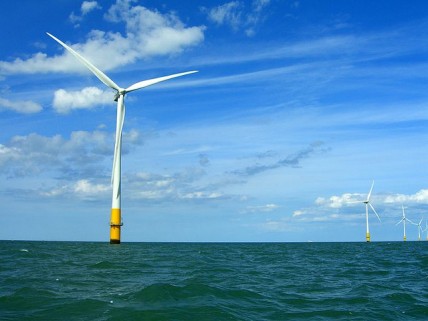
Offshore wind turbines in the Thames Estuary. Photograph by Phault
Science and technology have long been at the centre of green politics. It is a scientific understanding of nature that has identified so many key environmental concerns in the first place: biodiversity, pollution, climate change. And yet the green movement remains saddled with a reputation for “bad science” when it comes to GM crops and nuclear power.
Fred Pearce worries that the environment movement seem to be “turning up on the wrong side of the scientific argument”, while Keith Kloor talks of a “battle underway for the soul of environmentalism” between traditionalists and modernists. Mark Henderson’s Geek Manifesto even calls for a “clause four moment” in green politics, where it turns it back some of its history and supporters to find new ways to cement ties with science.
We can understand these concerns, but also worry that a simple call for more and more science marginalises the political contribution the green movement can offer. Rather than changing themselves to suck up to the increasingly powerful “geek lobby”, greens should be standing proud for what they can contribute to the public debate on science and technology. Scientists and members of the green movement – where they don’t already overlap – should be listening to each other more.
Greens and Science: An Elective Affinity?
Science is at the centre of much of green politics. If one wanted to be provocative, one might try to argue that green – not blue or red – is a uniquely scientific political hue. Much of the green case is based on a concern for natural world, and science is our way of looking as deeply and as rigorously as we can at nature. This year is the 50th anniversary of the publication of Rachel Carson’s Silent Spring. A piece of popular science writing as well as a call to environmental activism; it’s a classic in its use of science to highlight impact humans action (including actions based in scientific research) have had natural world. Call it an example of the risk society, the anthropocene or something else, it’s a now common trope in modern environmentalism. Like the biologist Julian Huxley’s role in the founding of the WWF the year before, Silent Spring is endemic of the way science’s ability to look carefully at the natural world alerts us to the negative impacts humans have had on it. To borrow a phrase from sociologist Steven Yearley, there is “elective affinity” between science and the greens, though as Yearley himself would be keen to stress, this doesn’t mean it’s a simple relationship.
Fights over GMO research last May provide one of the more painful expressions of tensions between parts of the scientific community and aspects of the green movement. An anti-GM group, Take the Flour Back, called for a protest, including possibly destroying crops which were part on long-term on-going research. The scientists whose work was at threat responded with an appeal to activists as environmentalists, stressing they were publicly funded research trying to learn more about the safety as well as usefulness of such crops. A counter-campaign was launched drawing support from across the scientific community and outside. The Nature news blog reported the protest itself, no research was destroyed, perhaps due to the large police presence, but it was “not a great day for an evidence-based approach to anything”. Martin Robbins bleakly painted an image of “a few dozen scruffy people… singing ‘Kumbaya’ and handing out baked goodies to the cops”, with an “anti-anti-GM” group on the other side, “geeks tapped away on iPads and smartphones, while the lizard people of Sense About Science cynically bribed reporters with ice cream”. Although some might class the outcome as a success for science, with the anti-GMO protesters successfully marginalised, the whole event seemed to entrench the idea of being “for” or “against” science in rather unproductive ways. As Jack Stilgoe later argued, such tribalism creates false enemies and interrupts debate before it’s even started.
Food security is not the only the only issue to have resurfaced recently in a way which would seem to draw battle lines within the green movement. High profile environmentalists like George Monbiot and Mark Lynas, increasingly throwing their weight behind nuclear power as a means of cutting carbon emissions, have wasted no time in calling out what they would describe as their less scientifically enlightened colleagues in the process (e.g. an open letter to David Cameron last March). It’s tempting to read nuclear debates as being about scientific evidence versus ideology: hard-headed rationalists dismissing those misty-eyed greens who maintain arguments against nuclear as ageing hippies that need to catch up. Except that the nuclear debate is economics too – lots of economics – and politics, lots of politics.
Serious green critiques of science have always been about power, not data. A hard-headed weighing of the risks of a radioactive leak vs. the risks of unmitigated climate change might prompt an advocacy of nuclear power. But that is to frame the issue in a particular way, a political decision in itself. Removing the real-politik from decisions about energy policy means ignoring the critical relationship between large-scale, centralised energy technologies and the corporate powers that control them. Questioning the values underpinning the various visions of the future science and technology offers us is not necessarily a matter of disputing empirical findings, or being unwilling to accept data inconvenient to an ideological position – its just a matter of being aware of the politics at play.
Merchants of Doubt and Certainty
It’s not just their scepticism of science and technology, which gets the greens into trouble with the scientific community; it’s their overconfidence in it too. In the wake of the 2009 “Climategate” hack, Mike Hulme wrote a piece for the Guardian complaining that climate camp activists misunderstood science as they tried to use it for political advocacy. Citing an example of a banner claiming protestors were “armed only with peer-reviewed science”, Hulme stressed they were armed with much more than that. The Climate Camp protest reflected a powerful vision of politics and economic justice, and should be open about that. Using phrases like “as demanded by the science” only emasculates public debate.
It is important to see that Climate Camp slogan in its political context too though. The campaigners were responding to concerns that they were dangerous; they wanted to suggest they were armed with something other than sticks. The actual banner has a set of ellipses as well as the word “only” between “armed” and “peer reviewed”. Read in such light, we could even see this as a relatively humble cultural reference to science, applied for its timidity, not ferocity. Moreover, why not stand behind some science? Especially as there are so many others quick to try to diminish the strength of scientific voices in this debate. We appreciate this may sound at odds with our earlier emphasis on the political nature of science and technology, but it is possible to be aware that science won’t win a battle outright, and still say it is part of the argument. We think our environmental policy decisions can cope with the small degree of nuance required to draw on science whilst also putting it in a social context. We think our environmental policy needs to be able to do this.
Steven Yearley suggests environmental NGOs were initially wary about campaigning on climate change; they were looking for concrete successes and this topic just looked like one designed to provoke and sustain controversy. Looking at recent campaigns, we might be excused for thinking some have returned to a rather 80s focus on saving animals and battling corporate corruption. It’s all bees, oil spills, gas bills and aircraft noise, with the complex, abstract and contested topic of climate change hiding in background. Maybe the climate science will come out from behind the polar bear pictures with the publication of the fifth IPCC report, or maybe not. Sense About Science are working on questions of the public understanding of uncertainty. Arguably this is a worthwhile, scientific and sensible thing to do, but considering the well documented well-funded and well-organised campaigns to spread doubt in climate science (the so-called “Merchants of Doubt”), it’s understandable many are concerned about such an approach. One person’s open and healthy acceptance of uncertainty is another’s “dragging heels with inaction”, or even stirring trouble. Uncertainty, like many aspects of environmental policy, is can easily be rhetorically deployed to a range of ends.
Luddites: anti-tech or alt-tech?
One of the more interesting aspects of the GMO fights this summer was the way that many protestors self-identified as Luddites. The word Luddite is often used as shorthand for reactionary opposition to technological advances, but it has a richer history. Formed as the industrial revolution replaced skilled craftspeople with systemised, automatic, and mechanical processes, the target of the Luddite movement was the eradication of particular forms of labour, not the new machines themselves. 200 years later, environmentalists with a political critique of corporate ownership of the food chain, or the privatisation of the global commons have more in common with the Luddites than their critics probably imagine. Luddites are not anti-technology per se, just strident in their questioning of particular technologies (even if some who celebrate the term over-use it as much as those who simply use it pejoratively). As David Edgerton argued in Nature last year, science has a long and distinguished history of Luddism, routinely making choices about which research not to fund, which direction not to go in, so as to free up resources for the work they do want to do. We all make choices about technology all the time, the trick is to notice this and make clever ones rather than sleepwalking into the futures that others choose for us.
The prospect of geoengineering – large-scale interference in the global climate system to either remove atmospheric carbon dioxide or reflect a certain proportion of sunlight back into space – provides a particularly interesting case. The same “devil’s bargain” arguments that advocates of nuclear power have used to justify expanding atomic energy as a low-carbon fuel are being strapped into place to frame the idea of climate engineering. What if some kind of catastrophic climatic emergency were to occur? Wouldn’t it be better to have done the geoengineering research, just in case?. Arguments like these are difficult to counter at face value – who would dispute the value of a backup plan, in case of a climatic emergency? But embedded deeply in rhetoric like this are assumptions that a green critique should challenge. What kind of world are we saving, if it is one that is smothered in a layer of industrial scaffolding, necessary to keep the sun’s rays out and the CO2 underground? Is simply asking the question a dangerous expression of political despair?
Challenging the values that any vision of the future embodies is not simply a matter of disputing empirical findings, or being unwilling to accept data inconvenient to an ideological position – its politics, pure and simple. Paul Kingsnorth dubs Stewart Brand, Mark Lynas and Emma Marris “neo-greens”, with a not-too-subtle reference to neo-liberal). This is rather an unfair jump, but, as Richard Jones notes of Mark Henderson’s Geek Manifesto, the complaint that greens put economic and political change before a technological fix is, itself, not an apolitical position. There is an ideology to Henderson’s approach as much as it seeks to demolish ideology. It is a manifesto after all and, in the chapter on greens in particular, seems to be quite open in its desire to maintain the status quo with respect to economic policy. The scientific community has a politics. It is mobilised to particular ends and works in particular ways – left, right and other. All of this is worth unpacking. Indeed, the political savvy of the green movement is something the scientific community could draw on for their own ends, helping unravel networks of climate change scepticism (e.g. the funding of think tanks), for example, or lobbying to push scientific work to industrial masters (e.g. recent fights over polar research). Adam Ramsey’s call to occupy BIS in defence of the Haldane Principle might not suit everyone, but it’s an example of the way science could find political resources in green politics.
Where Next for Greens and Science?
It is tempting to see a clean split between ‘modern’ greens who embrace GMOs, nuclear power or geoengineering, and Romantic tree-hugging hippies, suspicious of the shiny new world the Industrial Revolution promised. But behind the Frankenfoods mask, green activism is often less ‘anti-science’ and more a hopeful attempt at harnessing the power of science for social good. There are times where some members of the green movement could take a more nuanced approach to scientific evidence but that is true of most groups, scientific ones included. Science would do well to try to learn from the greens, as well as teach them.
Those who care about using the best possible science available to deal with environmental policy should find ways to connect scientists and members of the green movement, not wave terms like “luddite” “anti-science” or “neo-green” around as yet another way to delineate themselves from others. We know this is easier said than done, and that these are complex questions about complex groups with complex histories. We’d welcome more responses, disagreements, ideas and examples, and hope this will be the start of further debate on the topic.
Written by Adam Corner and Alice Bell
Adam Corner is a researcher and writer who focuses on the psychology of communicating climate change and public perceptions of energy technologies and geoengineering. He works in the Understanding Risk group in the School of Psychology at Cardiff University, for the Climate Outreach and Information Network, and edits the website Talking Climate.
Alice Bell is an academic and writer interested in science’s relationships with the rest of society. She currently runs a course on energy and climate change at Imperial College but is leaving to research science policy at Sussex next month. She keeps a personal blog.




